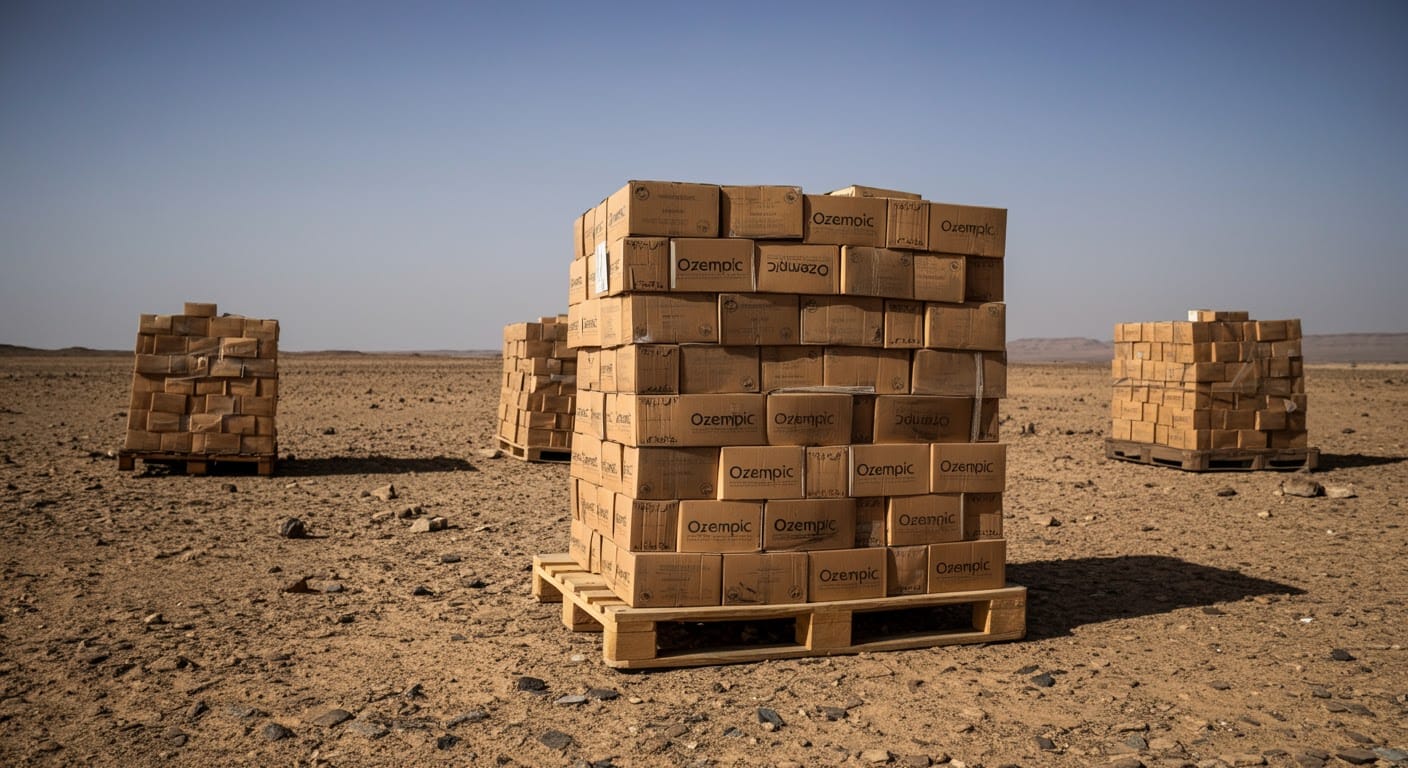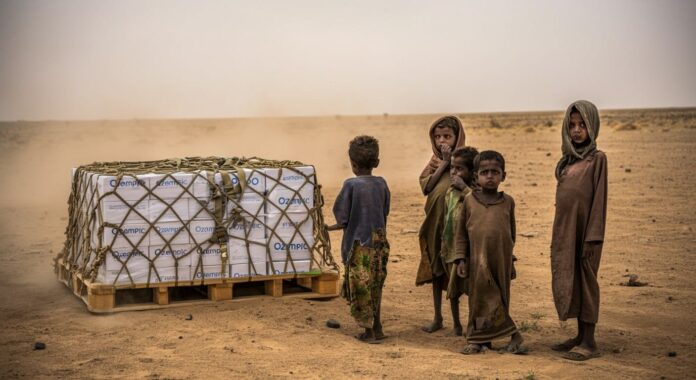Khartoum, Sudan — A multi-million dollar shipment of Ozempic, the diabetes drug now beloved by the affluent for its miraculous weight-loss properties, has been mistakenly sent to North Sudan. The incident has sparked outrage, panic, and a series of frantic diplomatic maneuvers as wealthy Westerners rush to reclaim their injectable fountain of youth.
When Global Supply Chains Go Rogue
According to sources close to the matter, the shipment—meant for private clinics and luxury spas in the U.S., Australia, and Europe—was somehow rerouted to North Sudan, a country more familiar with the challenges of food scarcity than the concept of voluntary weight loss. As word delivery spread, social media was ablaze with hashtags like #BringBackOzempic and #WeightLossCrisis2024, with influencers lamenting the tragic interruption of their weight management regimens.
“It’s a disaster of unimaginable proportions,” tweeted one fitness influencer, whose brand hinges on the promise of effortless slimness. “My next #ad campaign is ruined because someone couldn’t read a shipping label!”
Western Panic: A Crisis of Cosmetic Proportions
The panic in affluent communities has reached a fever pitch. Pharmacies from Beverly Hills to Bondi Beach reportedly see Ozempic stocks vanish faster than you can say “appetite suppressant,” leaving the wealthy and weight-conscious in a state.
“Do you know what this means?” said an anonymous hedge fund manager, clutching an empty syringe. “How am I supposed to maintain my portfolio and my waistline without my daily dose? This is an emergency!”
Indeed, emergency meetings have been held at the highest levels of government in the U.S., Australia, and Europe to address the situation. While these nations have been reluctant to intervene in North Sudan’s ongoing humanitarian crises, the misplacement of Ozempic has galvanized immediate action.
A New Market Opportunity?
Pharma giant Novo Nordisk, the manufacturer of Ozempic, issued a press release expressing “deep regret” over the mishap. However, the statement took an unexpected turn when the company hinted at the “exciting potential” of introducing Ozempic to new markets.
“We are exploring all avenues to rectify this error,” the statement read. “At the same time, we are committed to expanding the reach of our products globally. Who knows? Perhaps North Sudan’s an untapped market for those looking to manage their appetites in a challenging environment.”
Critics have criticized the company for its tone-deaf response, noting that North Sudan is a country where many people struggle to find enough food, let alone worry about curbing their appetites. “It’s as if they’ve completely lost the plot,” said one healthcare analyst. “This nation faces real, existential health crises, and they’re talking about potential market opportunities?”
On the ground in North Sudan, the reaction to the Ozempic shipment has been one of confusion and disbelief. Local officials were initially perplexed by the arrival of hundreds of boxes labeled in English, filled with sleek, clinical-looking injectors.

“What is this?” asked a local health worker, holding up a box. “Medicine? For what? We don’t have diabetes here at this scale, and even if we did, weight loss is not exactly our top priority.”
The boxes were quickly set aside as local authorities focused on more pressing concerns, such as securing food supplies and addressing the ongoing humanitarian crisis. In a small but telling moment, one regional leader quipped, “Perhaps we can trade this ‘Western luxury’ for something more useful, like actual food or medicine that addresses our needs.”
A Real-World Impact
While the debacle has been a goldmine for satire, it’s also highlighting a real and troubling issue: the global shortage of Ozempic, driven by its off-label use as a weight-loss drug. As wealthy individuals hoard the medication for aesthetic purposes, those who genuinely need it—like diabetics—are left in the lurch.
“I’ve been trying to get my prescription filled for weeks,” says Karen O’Connor, who has diabetes from Sydney. “But the shelves are empty because everyone and their dog use it to drop a few pounds. It’s infuriating.”

The situation is even worse in countries with less purchasing power, where the Ozempic shortage is causing genuine harm. Patients who rely on the drug to manage their blood sugar levels are facing severe health risks as supplies dwindle.
“The irony is just too much,” said Dr. Hamid, an endocrinologist in Melbourne. “We have a drug that can save lives, but instead, it’s being gobbled up by people who don’t need it, leaving those who do in a very precarious situation.”
The Ozempic mix-up and ensuing panic in the West are more than just a comedy of errors—they’re a stark reminder of the inequalities in global healthcare. The fact that a drug designed to treat a chronic has been co-opted by the wealthy for weight loss is emblematic of a broader problem: the misallocation of resources in a world where the rich get richer and the poor are left behind.
As Western governments scramble to retrieve their precious shipment, the rest of the world is left wondering: What will it take for us to get our priorities straight? Perhaps it’s time to inject a dose of reality into the conversation—before we find ourselves amid an even bigger crisis.
But for now, it seems the only thing slimming down is our sense of global responsibility.

